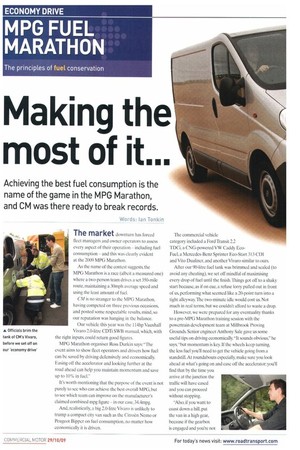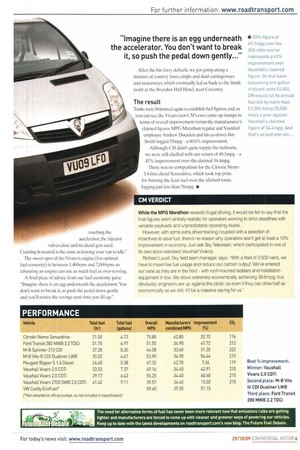MPG FUEL MARATHON
Page 48

Page 49

If you've noticed an error in this article please click here to report it so we can fix it.
The principles of fuel conservation
Making the most of it...
Achieving the best fuel consumption is the name of the game in the MPG Marathon, and CM was there ready to break records.
Words: an Tonkin
The market downturn has forced fleet managers and owner operators to assess every aspect of their operation including fuel consumption and this was clearly evident at the 2009 MPG Marathon.
As the name of the contest suggests, the MPG Marathon is a race (albeit a measured one) where a two-person team drives a set 350-mile route, maintaining a 30mph average speed and using the least amount of fuel.
CM is no stranger to the MPG Marathon, having competed on three previous occasions, and posted some respectable results, mind, so our reputation was hanging in the balance.
Our vehicle this year was the 114hp Vauxhall Vivaro 2.0-litre CDTi SWB manual, which, with the right inputs, could return good figures.
MPG Marathon organiser Ross Durkin says: "The event aims to show fleet operators and drivers how fuel can be saved by driving defensively and economically. Easing off the accelerator and looking further at the road ahead can help you maintain momentum and save up to 10% in fuel."
It's worth mentioning that the purpose of the event is not purely to see who can achieve the best overall MPG, but to see which team can improve on the manufacturer's claimed combined mpg figure in our case, 34.4mpg.
And, realistically, a big 2.0-litre Vivaro is unlikely to trump a compact city van such as the Citroen Nemo or Peugeot Bipper on fuel consumption, no matter how economically it is driven. The commercial vehicle category included a Ford Transit 2.2 TDCi, a CNG-powered VW Caddy EcoFuel, a Mercedes-Benz Sprinter Eco-Start 313 CDI and Vito Dualiner, and another Vivaro similar to ours.
After our 90-litre fuel tank was brimmed and sealed (to avoid any cheating), we set off mindful of maximising every drop of fuel until the finish. Things got off to a shaky start because, as if on cue, a refuse lorry pulled out in front of us, performing what seemed like a 20-point turn into a tight alleyway. The two-minute idle would cost us. Not much in real terms, but we couldn't afford to waste a drop.
However, we were prepared for any eventuality thanks to a pre-MPG Marathon training session with the powertrain development team at MilIbrook Proving Grounds. Senior engineer Anthony Sale gave us some useful tips on driving economically. "It sounds obvious," he says, -but momentum is key. If the wheels keep turning, the less fuel you'll need to get the vehicle going from a standstill. At roundabouts especially, make sure you look ahead at what's going on and ease off the accelerator; you'll find that by the time you arrive at the junction the traffic will have eased and you can proceed without stopping.
"Also, if you want to coast down a hill, put the van in a high gear. because if the gearbox is engaged and you're not touching the accelerator, the injector valves close and no diesel gets used.
coasting in neutral is the same as leaving your van to idle."
The sweet-spot of the Vivaro's engine (for optimal fuel economy) is between 1,400rpm and 2,000rpm, so labouring an engine can use as much fuel as over-revving.
A final piece of advice from our fuel-economy guru: "Imagine there is an egg underneath the accelerator. You don't want to break it, so push the pedal down gently and you'll notice the savings next time you fill up." After the bin lorry debacle, we got going along a mixture of country lanes, single and dual-carriageways and motorways. which eventually led us back to the finish point at the Brandon Hail Hotel. near Coventry.
The result
Tanks were brimmed again to establish fuel figures, and, as you can see, the Vivaro (not Clirs one) came up trumps in terms of overall improvement versus the manufacturer's claimed figures, MPG Marathon regular and Vauxhall employee Andrew Duerden and his co-driver Jim Smith logged 55mpg a 60.6% improvement.
Although CM didn't quite topple the stalwarts,
we were still chuffed with our return of 49.1mpg a 43% improvement over the claimed 34.4mpg.
There was no competition for the Citroen Nemo 1.4-litre diesel Sensodrive, which took top prize for burning the least fuel over the allotted route, logging just less than 76mpg. •








































































































































